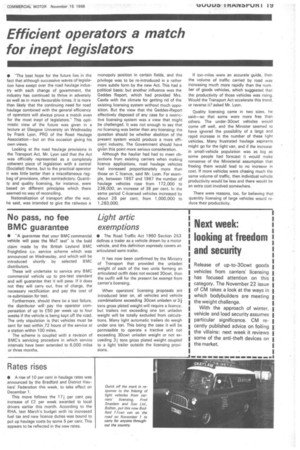Efficient operators a match for inept legislators
Page 21

If you've noticed an error in this article please click here to report it so we can fix it.
• The best hope for the future lies in the fact that although successive waves of legislation have swept over the road haulage industry with each change of government, the industry has continued to thrive in adversity as well as in more favourable times, It is more than likely that the continuing need for road haulage combined with the general efficiency of operators will always prove a match even for the most inept of legislators.' This optimistic view of the future was given in a lecture at Glasgow University on Wednesday by Frank Lyon, PRO of the Road Haulage Association—but on this occasion giving his own views.
Looking at the road haulage provisions in the Transport Act, Mr. Lyon said that the Act was officially represented as a completely coherent piece of legislation with a central (Socialist) theme, but to the practical operator it was little better than a miscellaneous ragbag of provisions, often contradictory. Quantity and quality licensing, for instance, were based on different principles which there seemed no way of reconciling.
Nationalization of transport after the war, he said, was intended to give the railways a monopoly position in certain fields, and this privilege was to be re-introduced in a rather more subtle form by the new Act. This had a political basis: but another influence was the Geddes Report, which had provided Mrs. Castle with the climate for getting rid of the existing licensing system without much opposition. But the view that the Geddes,Report effectively disposed of any case for a restrictive licensing system was a view that might be challenged. It was not enough to say that no licensing was better than any licensing: the question should be whether abolition of the present system would produce a more efficient industry. The Government should have given this point more serious consideration.
Although the haulier had had to meet objections from existing carriers when making licence applications, road haulage vehicles had increased proportionately more than those on C licence, said Mr. Lyon. For example, between 1957 and 1967 the number of haulage vehicles rose from 172,000 to 238,000, an increase of 38 per cent. In the same period C-licensed vehicles increased by about 28 per cent, from 1,000,000 to 1,283,000. If ton-miles were an accurate guide, then the volume of traffic carried by road was increasing much more rapidly than the number of goods vehicles, which suggested that the productivity of those vehicles was rising. Would the Transport Act accelerate this trend, or reverse it? asked Mr. Lyon.
Quality licensing came in two sizes, he said—so that some were more free than others. The under-30cwt vehicles would come off well, and the Minister seemed to have ignored the possibility of a large and rapid increase in the number of these light vehicles. Many frustrated haulage aspirants might go for the light van, and if the increase in small-vehicle population was as big as some people had forecast it would make nonsense of the Ministerial assumption that freeing them would lead to no increase in cost. If more vehicles were chasing much the same volume of traffic, then individual vehicle productivity would be less and there would be an extra cost involved somewhere.
There were reasons, too, for believing that quantity licensing of large vehicles would reduce their productivity.




















































































































